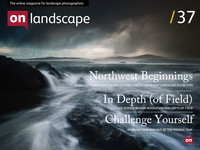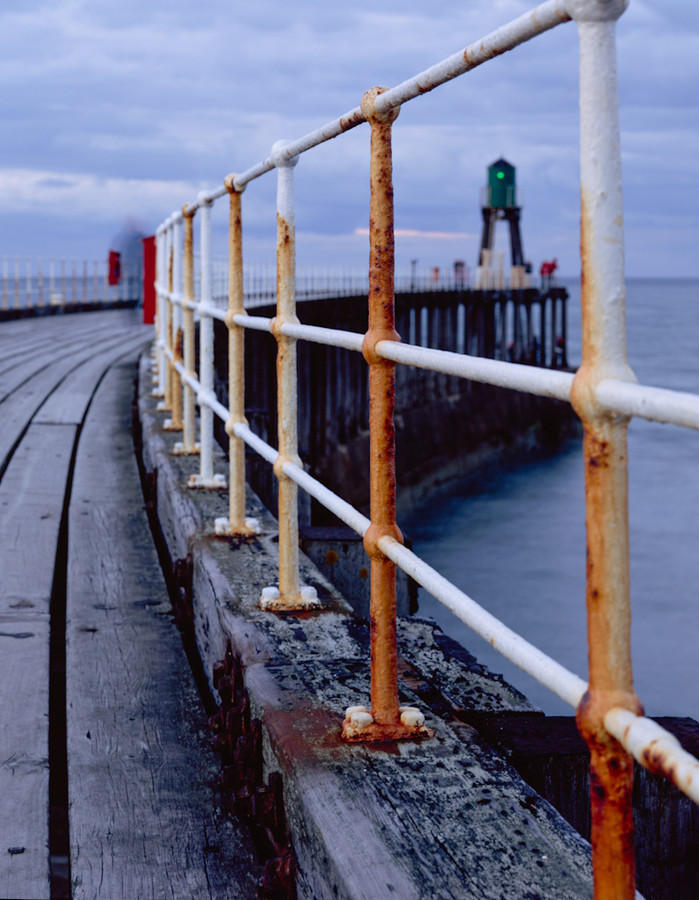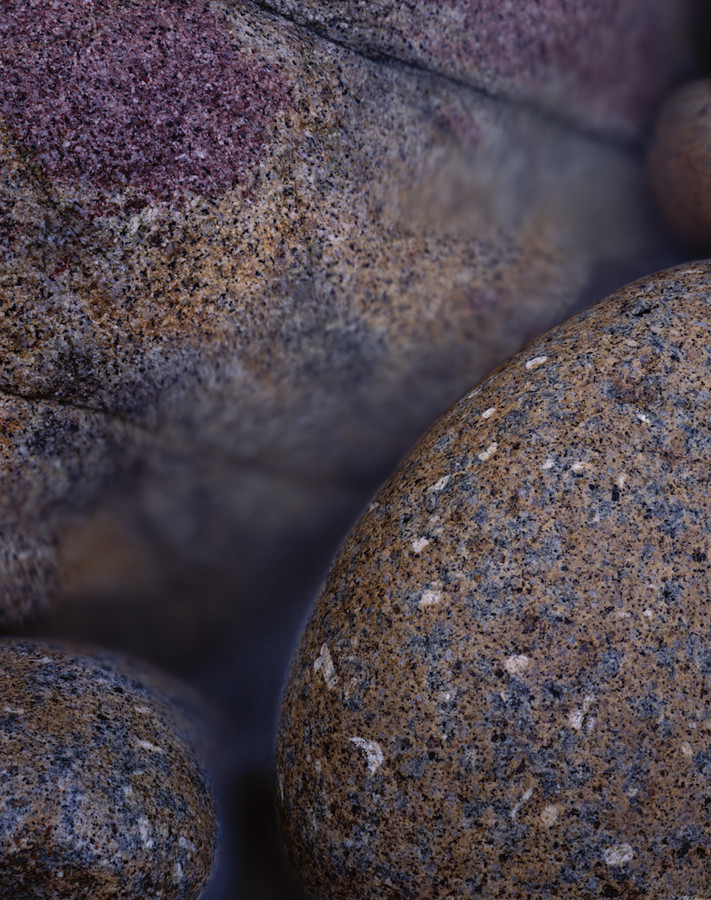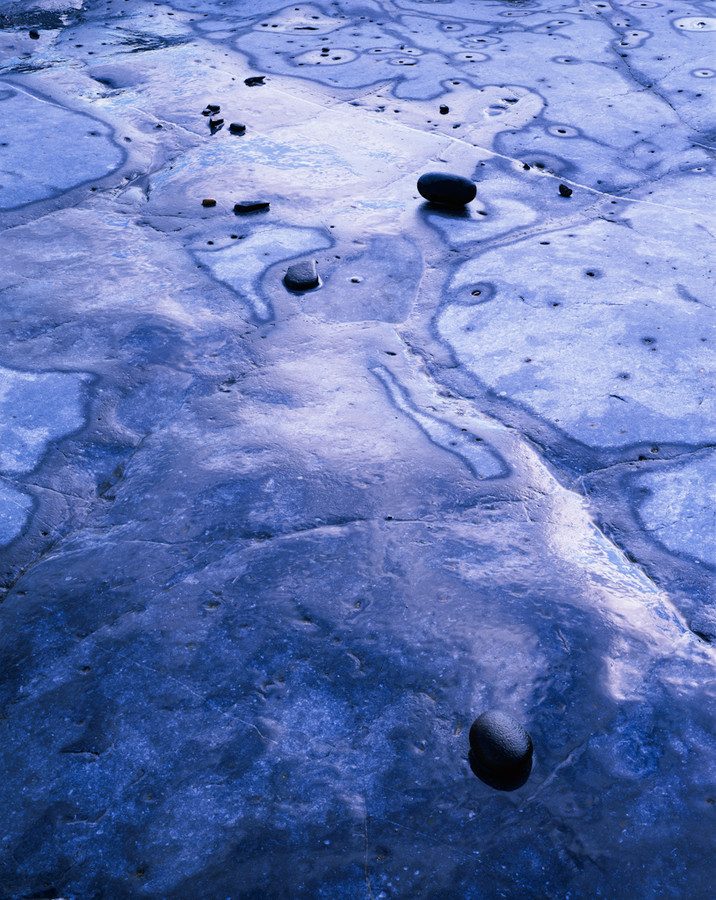Featured photographer

Tim Parkin
Amateur Photographer who plays with big cameras and film when in between digital photographs.
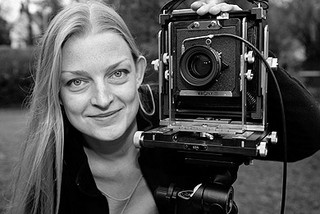
Quite often, the serious landscape photographer, particularly the large format variety, is thought of as a typically male profession - however, when we do see many women picking up a camera they quite often show just what the men should have been doing all along. Mel Foster is very good example of someone who stepped into her photography with an almost perfectly formed style from day one (especially with her large format output). She is also another example of the musical photographer, I'll let her tell you more about that.
In most photographers lives there are 'epiphanic’ moments where things become clear, or new directions are formed. What were your two main moments and how did they change your photography?
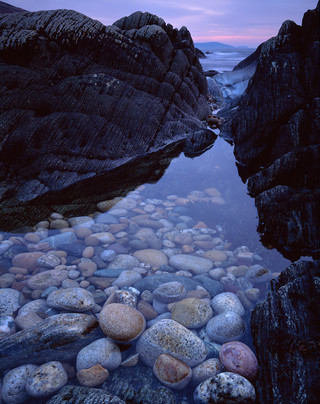 For many years I pursued photography as a hobby, which gathered momentum quietly over the years. A major turning point for me was a 5 week photographic trip with my husband around several National Parks and Wilderness Areas in America. We witnessed many amazing places, and for the first time I was up for dawn and out for sunset pretty much every day in a row, with good ol’ Jeremy by my side! A lot of slide film later, and a big overdraft to boot, I had the most incredible memories and some images that I was really pleased with. I was definitely hooked. But what next?
For many years I pursued photography as a hobby, which gathered momentum quietly over the years. A major turning point for me was a 5 week photographic trip with my husband around several National Parks and Wilderness Areas in America. We witnessed many amazing places, and for the first time I was up for dawn and out for sunset pretty much every day in a row, with good ol’ Jeremy by my side! A lot of slide film later, and a big overdraft to boot, I had the most incredible memories and some images that I was really pleased with. I was definitely hooked. But what next?
On our travels we also spent time visiting book shops and galleries when the sun was too bright to make images. We saw work by Michael Fatali, Tom Till and David Muench but to name a few. I bought books by Dykinga, Linde Waidehofer and anything else of interest that came to hand. There were a few images that really took my breath away, and as I’d found previously, more often than not they seemed to be taken with large format cameras. Was there anything in this? I had wondered for some time about whether I was just hankering after the wooden box, or whether there was something in the nature of the way it worked that made these images so appealing to me.
A while later I came across an advert for Light & Land and a particular course they offered exclusively for large format cameras lead by Joe Cornish and David Ward. It seemed I could go and try out a camera on a 4 day course and see if the niggling idea that was burning a hole in my brain was actually worth pursuing. Needless to say it confirmed my suspicions, and my passion for photography hit a new high. It felt like the ideas and images I’d been wanting and trying to make for a while could come to fruition at last. Now the corner had been turned there was no looking back... (More about LF impact on my photography in later camera question.)
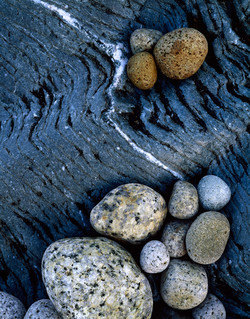 Tell me about why you love landscape photography? A little background on what your first passions were, what you studied and what job you ended up doing
Tell me about why you love landscape photography? A little background on what your first passions were, what you studied and what job you ended up doing
I had an amazing childhood - I remember lots of playing outside, building camps (igloos in the years with lots of snow) and watching the garden birds from my bedroom window. (My brother and I even had a little Pentax compact each for Christmas one year.) My parents were always making things with us, whether it was a way to entertain us or as part of a school project, they both took lots of time to be creative with us. I never really thought much about how this might have sown some artistic seeds, as I didn’t even do art gcse - didn’t really think I was much good at drawing or painting. Besides, I got into music from an early age - and the clarinet lessons took over from messing around with a recorder at about the age of 9. It didn’t really start to get serious until my early teens when I went on my first NYWO (National Youth Wind Orchestra) course. I had already been enjoying the local music centre groups, but the level of playing on the course was so much better, and some of the older students were already at music college. It was inspiring to have a peek into a world where you rehearsed for few days and then did several concerts at this level, and I began to imagine myself as a musician...So obviously I ended up studying Spanish!?
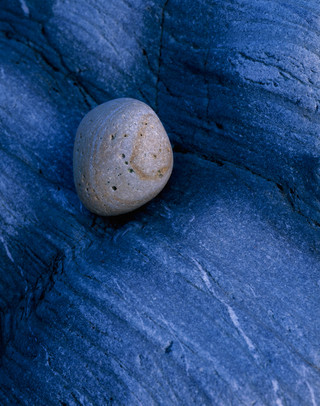 When faced with a year abroad as part of my Spanish Degree my parents bought me an SLR. I enjoyed photography, but still really from a documentary stance - I wanted to be able to show friends and family back home what I’d seen on my travels. As the initial pictures came back, I was quite pleased with the results, and slowly the photography became the reason for making the images rather than the other way around. I travelled every month to Madrid for clarinet lessons, and visited the art galleries and exhibitions as I also had done back in London with my friends at music college. As the end of the course drew near I started (!) to think carefully about how I might actually make a living after University, and realised that if at all possible, I really wanted to be a musician. With the backing of my already bankrupt parents I auditioned for music college and got a place. Whilst studying music I met my now husband, who is also largely responsible for reawakening my love of the outdoors with trips to the Lake District and later on for agreeing to a 5 week photographic trip to the USA traveling around lots of National Parks and Wilderness Areas when my photography ‘hobby’ started to reach new obsession levels the year before I finally made the move up to large format...
When faced with a year abroad as part of my Spanish Degree my parents bought me an SLR. I enjoyed photography, but still really from a documentary stance - I wanted to be able to show friends and family back home what I’d seen on my travels. As the initial pictures came back, I was quite pleased with the results, and slowly the photography became the reason for making the images rather than the other way around. I travelled every month to Madrid for clarinet lessons, and visited the art galleries and exhibitions as I also had done back in London with my friends at music college. As the end of the course drew near I started (!) to think carefully about how I might actually make a living after University, and realised that if at all possible, I really wanted to be a musician. With the backing of my already bankrupt parents I auditioned for music college and got a place. Whilst studying music I met my now husband, who is also largely responsible for reawakening my love of the outdoors with trips to the Lake District and later on for agreeing to a 5 week photographic trip to the USA traveling around lots of National Parks and Wilderness Areas when my photography ‘hobby’ started to reach new obsession levels the year before I finally made the move up to large format...
I’m working now as a freelance musician, peripatetic music teacher and photographer - although the photography only forms a small part of my earnings. Being self-employed I don’t really see any boundaries between my musical and photographic endeavours, as they are all a fully integrated part of what I do (and who I am). So much that I ‘do’ (music practice, investigate new music/art, photograph the landscape) isn’t paid by the hour (or even paid at all!). Maybe that makes it easier to combine both my passions. I’m sure anyone who’s self-employed finds themselves in a similar state of evolution and development of ideas and skills.
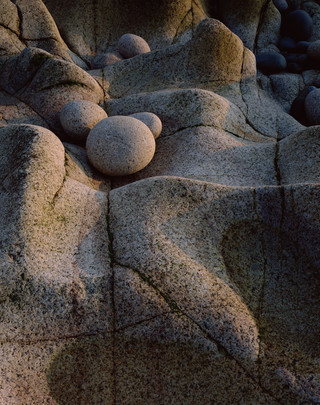
I love landscape photography because it’s a way I can express my love of nature and the world around us. I find myself absorbed with a child-like fascination taking in the scene around me, exploring the possibilities and enjoying the discovery of details or elements from which an image might evolve. I find this voyage of discovery and the exploratory nature of making images stimulating and very addictive. I love the way that being a photographer encourages me to really see, and appreciate the detail in even the most common place or everyday situations - sometimes to the point where through the process of making an image I can transform it into something of beauty.
Does your music inform your photography in any way?
Even if they don’t directly inform one another, there is a lot that goes hand in hand. As with most things you usually start by learning a set of skills. I think working as a musician will have given me an important grounding in a type of unspoken coordination between technical skills and self expression that could be quite advantageous. Both music and photography are crafts which concentrate on a type of expression that is non-verbal, and when they are at their best are full of nuance, variation and character. Although they can both be broken down into simple underlying structures and shapes, these are not the essence of their art. In the same way that music and photography have fundamentals of technique and composition, neither amount to much without individual expression, interpretation and vision. I am often reminded of certain pieces of music, or indeed listening to music whilst out in the landscape making images, but more from a perspective of enjoying both my passions rather than one informing the other.
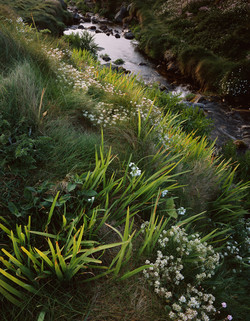 You’ve just started a family too (congratulations!) do you have plans for sherpa training in the near future? More seriously, will the whole family be coming out on photography trips?
You’ve just started a family too (congratulations!) do you have plans for sherpa training in the near future? More seriously, will the whole family be coming out on photography trips?
An extra sherpa would be very useful, although in reality the current sherpa will be more heavily laden! I'd hope that the family would join me on most photography excursions - highly likely as Jeremy is just as keen on being outdoors and we both want our daughter to grow up with the same appreciation of the world around her that we have. I've read with interest some articles by Niall Benvie on not only combining family life and photography, but also our duty as parents to ensure our children connect with nature. 'Rewilding Childhood' is also a topic of concern for the National Trust, as besides the health reasons for being active and enjoying some fresh air, a proper connection with nature is of paramount importance - why would future generations want to work hard to safeguard something they don't relate to?
Having a young (10 weeks old!) family will also push me to make more of my immediate surroundings from a practical point of view - rather than always looking to go further afield. The image Ice & Oak Leaves is a good example of how you can make an image on your doorstep!
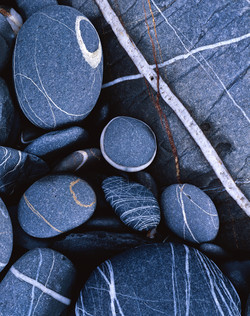 There seems to be a surfeit of men ‘into’ landscape photography; Why do you think that is?
There seems to be a surfeit of men ‘into’ landscape photography; Why do you think that is?
Hard to say. I don't think it's due to a lack of interest or artistic ability. I guess photography might initially be more appealing to gadget fans - there does seem to be more importance placed on what you use over the results sometimes. I can only speak for myself, but I'm certainly not as bothered with lots of things unless I can see how they effect the image. I do like to know how things work, but I'm maybe too focused on making the image over everything else. I love my new iPad - but that's because it's beautifully designed and the 'workings' aren't so relevant to the user - unless it's to submit a file to be viewed on one, I don't feel the need to find out how many pixels the screen has! Maybe the women that are into landscape are happy purely doing it for themselves, and combined with a generalised lack of interest in computers, how would we ever know about them? It has occurred to me trying to think of an answer to this question how sometimes a website is the only means of viewing someone's work (and that's a big wake up call to update mine, after the best part of 2 years without an update - pretty disgraceful). I do also think that unless you've had the time and space to pursue a passion like landscape photography beforehand, it would be very difficult to start to do so whilst bringing up a family, especially if the partner is in a 'normal' full time job and not around to help with family life.
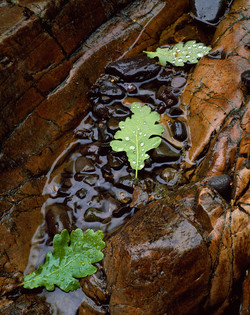 Could you tell us a little about the cameras and lenses you typically take on a trip and how they affect your photography.
Could you tell us a little about the cameras and lenses you typically take on a trip and how they affect your photography.
All the images on my website and shown here were taken on an Ebony large format camera with either a 90mm, 120mm, or 150mm lens. (I'd love a Nikkor 270T if any turn up secondhand - the bellows on the camera don't extend enough for longer lenses.) I also use a Lumix LX3 which I really enjoy, as both a digital notebook for the 'High Impact' camera (as my friends have nicknamed it) and to experiment with in its own right. Using large format has definitely changed the way I work. Firstly you have to slow down and go through the visual process of searching for the image without the camera stuck to your face! I love how this makes me interact more with my surroundings. Once the camera is out and I'm under the dark cloth the isolation it provides from the surroundings help to me focus solely on the image, and the further abstraction of it being upside down on the ground glass screen helps balance composition and colour. Having used this exclusively for several years, the Lumix has added more flexibility and freedom which I'm also enjoying.
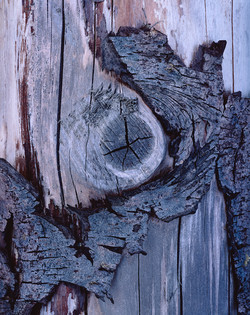 What sort of post processing do you undertake on your pictures? Give me an idea of your workflow..
What sort of post processing do you undertake on your pictures? Give me an idea of your workflow..
As they're mostly transparencies, it's mostly a case of scanning and doing a small amount of remedial work in photoshop so that the scan resemble the transparency again, or what I'd envisaged the image should look like when printed. I often rely on David Whistance's expertise in this area.
Do you get many of your pictures printed and, if at all, where/how do you get them printed?
I think it's really important to take images beyond the transparency or digital file. So much is virtual today, and I'm one of those old fashioned people who needs tangible things to hold. I still love looking at transparencies on a light box, but do also enjoy the further transformation to a print. I employ the expertise of David Whistance (who I very highly recommend) to print my images - especially if they are for my portfolio, exhibitions or for clients.
Tell me about the photographers that inspire you most. What books stimulated your interest in photography and who drove you forward, directly or indirectly, as you developed?
I'll try and be brief! Early on I loved Adams, Muench, Weston, Fatali, Dykinga - all the usual suspects. I came across the work of Burkett in the gallery in Yosemite, Waidhofer in Arches, and enjoyed reading the writings of Galen Rowell - the first insight into some of the thought processes of the 'The Inner Game of Landscape Photography'. Since then books or exhibitions by Kertesz, Kenna, Porter, Wakefield, Dombrovski (Simply), Bell (Primal Places), Norfolk, Töve (Speglingar is my current reading material), Cornish (First Light, Scotlands Coast, Scotlands Mountains and A Photographer at Work) and Ward (Landscape Within, Landscape Beyond) have all had an impact. I can't really thank Joe Cornish and David Ward enough for the incredible inspiration and guidance they've been generous enough to give to me both on the fateful first large format course in Whitby and over the subsequent years. There's no doubt in my mind that I wouldn't have got to this point without them and I'm very grateful for the catalytic effect they had on my development and new levels of photography addiction! I've also learnt a tremendous amount from Eddie Ephraums and loved exploring new ways to think of making images and presenting them.
Tell me what your favourite two or three photographs are and a little bit about them.
Whitby Pier Railings has to be in this selection, even if just from a sentimental point of view as my first experience of large format. I still enjoy the composition and mood of this image even now.
Nanven Curves - Often "Keep it simple, stupid!" rings in my head (thanks David!), although jesting aside, it's a serious and valuable point. I think it's the simplicity of this image that I love, and I'm still surprised that despite how little is in it, I don't seem to tire of it.
Northumberland Reflections - I like how the reflected sky in the water resembles a spilt ink pot. This was one of those times where the composition was instinctively seen and seemed to just make sense.
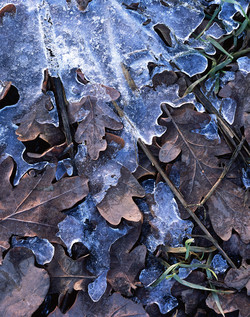 If you were told you couldn’t do anything art, photography or music related for a week, what would you end up doing? (i.e. Do you have a hobby other than photography..)
If you were told you couldn’t do anything art, photography or music related for a week, what would you end up doing? (i.e. Do you have a hobby other than photography..)
If art includes book binding, box making and rubber stamps, then I guess if at home I could get stuck into some fine food and wine, or go on holiday with Jeremy and Daisy without a camera (what not even for family photos!?).
What sorts of things do you think might challenge you in the future or do you have any photographs or styles that you want to investigate? Where do you see your photography going in terms of subject and style?
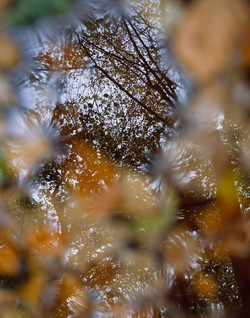 I've been revisiting some photographers work that I haven't looked a for a while, as I've noticed over the years that as my own style develops my reaction or appreciation of others work has also changed. Here are few images that spring to mind that especially intrigue me. I love 'Martinique' by André Kertesz - its mystery, beauty, simplicity and balance produce a dreamlike quality. 'Untitled (from the series 'The Loft From Inside In' by W Eugene Smith has lovely echoes of shape between the guitarist and the double bass because the photographer has chosen to only include part of them on opposite sides of the frame. There are images by Paul Wakefield that I know I wouldn't previously have 'understood' and now I find they're my favourites. They've been partly responsible for me making more sculptural images and with the others I mentioned previously, also thinking more about negative space and selective inclusion or exclusion. I'm also trying to make slightly more experimental images and push myself out of my comfort zone. These last couple of years I've also been working more on others ways of presenting my images, including handmade books and clamshell boxes. Watch this space!
I've been revisiting some photographers work that I haven't looked a for a while, as I've noticed over the years that as my own style develops my reaction or appreciation of others work has also changed. Here are few images that spring to mind that especially intrigue me. I love 'Martinique' by André Kertesz - its mystery, beauty, simplicity and balance produce a dreamlike quality. 'Untitled (from the series 'The Loft From Inside In' by W Eugene Smith has lovely echoes of shape between the guitarist and the double bass because the photographer has chosen to only include part of them on opposite sides of the frame. There are images by Paul Wakefield that I know I wouldn't previously have 'understood' and now I find they're my favourites. They've been partly responsible for me making more sculptural images and with the others I mentioned previously, also thinking more about negative space and selective inclusion or exclusion. I'm also trying to make slightly more experimental images and push myself out of my comfort zone. These last couple of years I've also been working more on others ways of presenting my images, including handmade books and clamshell boxes. Watch this space!
Who do you think we should feature as our next photographer?
Nigel Halliwell and Anna Booth in no particular order!
Many thanks to Melanie Foster for her comments - you can find out more about her at http://www.melaniefoster.co.uk/ but we have have to privilege of showing many images here that have not been seen before or at a larger size for your greater appreciation.

